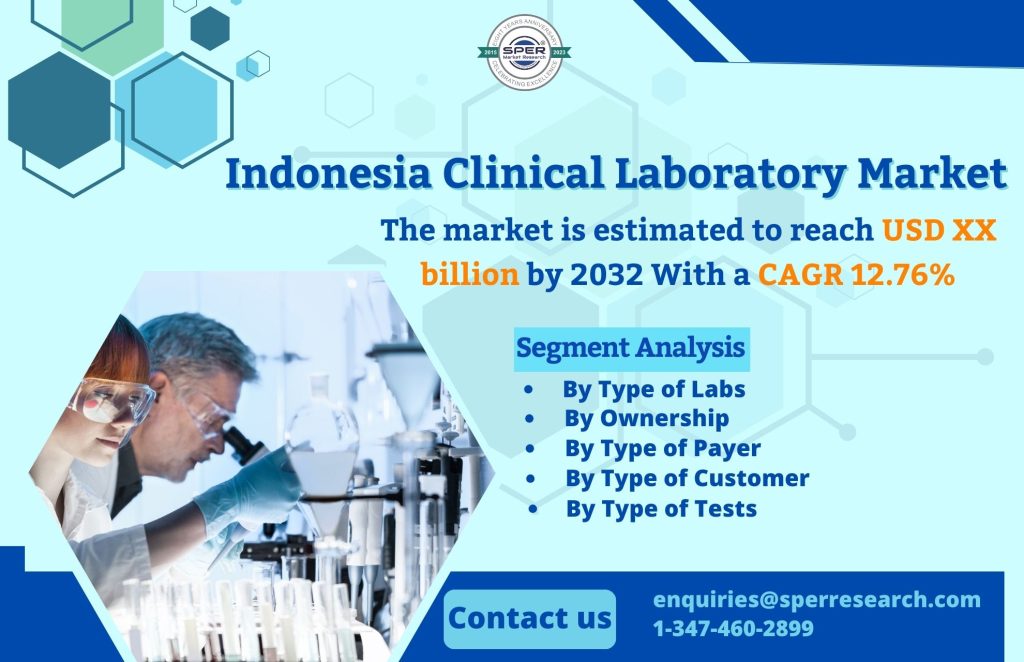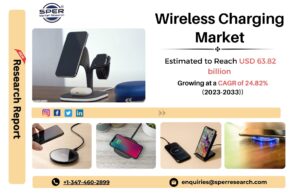Healthcare facilities that offer a variety of laboratory tests to help doctors diagnose, treat, and manage patients are known as clinical laboratories. The scientists working in these labs are qualified to conduct and evaluate tests on biological specimen samples that have been obtained from patients. Under the direction of skilled medical professionals, this laboratory is an institution that combines human ability with highly advanced computerized automated instruments to guarantee the highest quality services for the best patient care. The laboratory has consistently attempted to uphold the highest level with skilled laboratory professionals, administrative personnel, and other support workers.
According to SPER Market Research, ‘Indonesia Clinical Laboratory Market Size- By Type of Labs, By Ownership, By Type of Payer, By Type of Customer, By Type of Tests- Regional Outlook, Competitive Strategies and Segment Forecast to 2032’ states that the Indonesia Clinical Laboratory Market is estimated to reach USD XX billion by 2032 with a CAGR of 12.76%.
The industry will expand as a result of new hotels being built with larger ballrooms and conference areas, more foreign traveler traffic that is expected, an increase in the number of healthcare facilities housing more in-patients, and the growth of industrial facilities that require catering services. It’s expected that demand for laboratory services will rise with the implementation of JKN (Jaminan Kesehatan Nasional), a national health insurance system. Large private independent laboratory chains are also expected to spread into less developed areas and outside major cities. Consequently, clinical laboratories throughout Indonesia will see an increase in market share. Digital pathology’s increasing acceptance has increased demand for clinical laboratory services.
New diagnostic test and equipment approval procedures can include a drawn-out, bureaucratic regulatory process. Businesses may be deterred from joining the Indonesian market as a result. Indonesia’s national health insurance scheme does not cover every diagnostic test. This may render them costly for certain patients, particularly those residing in remote regions. Manpower scarcity: In Indonesia, there is a deficiency in skilled technicians and pathologists. This may cause test results to be delayed and restrict the number of diagnostic laboratories that can be used. The vast archipelago of Indonesia contains numerous isolated locations. It might be costly and challenging to provide diagnostic tools and qualified workers to these areas. For a sizable segment of the populace, this restricts access to diagnostics.
Request For Free Sample Report @ https://www.sperresearch.com/report-store/indonesia-clinical-laboratory-market.aspx?sample=1
Impact of COVID-19 on the Indonesia Clinical Laboratory Market
Because of Covid-19, more people are aware of Indonesia’s healthcare system and standard of care. The components for health and education, or the one that did, increased as
household spending fell. Even while the shutdown resulted in a decrease in routine testing, an increase in COVID-19 testing volume has helped the industry to progressively begin to grow. COVID-19 carriers increased in number over time. Thanks to technical developments such as micro-fluidic circuits, consumers can now self-diagnose at home. For example, the EUA has approved and given EUA for two new over-the-counter tests for COVID-19 testing at home.
Indonesia Clinical Laboratory Market Key Players:
The Java island, and particularly Jakarta, dominates the market. Significant private laboratory chains, such Kimia Farma and Prodia, are present here. Some of the Key Players are ABC Labs, Bio Medika, Cito, Diagnos, Kimia Farma, Parahita, Pathlab, Pramita, Prima Medika, Prodita, Ultra Medica.
Indonesia Clinical Laboratory Market Segmentation:
The SPER Market Research report seeks to give market dynamics, demand, and supply forecast for the years up to 2033. This report contains statistics on product type segment growth estimates and forecasts
By Type of Labs: Based on the Type of Labs, Indonesia Clinical Laboratory Market is segmented as; Independent Labs (Organized, Unorganized), Private Hospital Labs, Public Hospital Labs.
By Ownership: Based on the Ownership, Indonesia Clinical Laboratory Market is segmented as; Private Labs, Public Labs.
By Type of Payer: Based on the Type of Payer, Indonesia Clinical Laboratory Market is segmented as; Social Insurance Administration Organization, Corporates, Out-Of-Pocket, Private Insurance.
By Type of Customer: Based on the Type of Customer, Indonesia Clinical Laboratory Market is segmented as; Corporates, Doctor Referral, External Referrals, Online Referrals, Walk-Ins.
By Type of Tests: Based on the Type of Tests, Indonesia Clinical Laboratory Market is segmented as; Esoteric (Allergic Disease, Endocrine, Infectious Diseases, Oncology, Others), Non-Laboratory, Routine (Basic Metabolic Panel, A1C, Others).
By Region: High rates of urbanization and affluent populations in Java, Jakarta, and Bali have increased access to and demand for private clinical laboratory testing services.
This study also encompasses various drivers and restraining factors of this market for the forecast period. Various growth opportunities are also discussed in the report.
For More Information, refer to below link:-
Indonesia Clinical Laboratory Market Growth
Related Reports:
Follow Us –
LinkedIn | Instagram | Facebook | Twitter
Contact Us:
Sara Lopes, Business Consultant – U.S.A.
SPER Market Research
+1-347-460-2899



